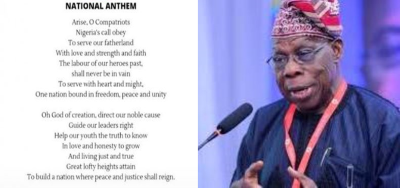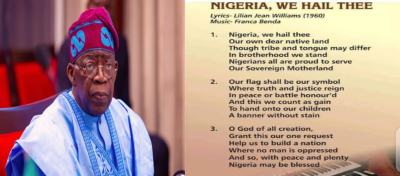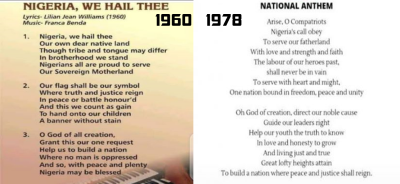Advertise Your Business here, send email to us:
developmentwatchersafrica@gmail.com Please call: 08092920009, 08027012449 WhatsApp: 08155242424
TWO NATIONAL ANTHEMS, 1960 and 1978:
Why Nigeria returned to 1960
Imagine words are humans, they would be asking, “Why are we regularly contorted, manipulated and used to transmit inconsistencies and complexities, used to create unmindful feelings without resonating confidence?” They would continue, “Why are we usually bashed, tapered like arrows and used to drill the minds of people without any indicative remorse?”
Questions aside, in truth, are words not tools; are they not instruments of creation, are they not appropriated to deliver the good, the bad and the ugly? No doubt, words are developed, fashioned and tailored to present rhetorics as the palliative choice in placing understanding..
In a documentation in President Reagan Presidential Foundation Institute in the United States of America, dated August 12, 1986, with key points centered on testament of truth, it posits that, “government creates unpredictability due to constantly changing policies; and that government goals sometimes don’t align with the nation’s goals.” From here, President Ronald Reagan, affirmed that “the most terrifying words in the English language are: I am from the government and I’m here to help.”
Many took that expression out of context, believing it was a ridiculous painting of government’s posture as it concerns governance. But that may be true in some cases. The role of government is principally to listen to the people and work to assuage their worrisome demands and prove that governance, after all, is a workable venture that comes with the delivery of its dividends.
Every government comes to take care of responsibilities but many leaders think they are “here to help.”

President Olusegun Obasanjo introduced the 1978 National Anthem.
What looks like a confusing war of words in the two Nigerian National Anthems exposes the tiny inconsequential in what seemed to be a worrisome debate leading to the banishment of the offender, the national anthem of 1978 adopted by President Olusegun Obasanjo.
The national anthem of 1978 came from indigenous minds, Nigerians who took the collective realities of the nation wrapped around emerging and converging inclusiveness to come up with a national anthem. ‘Arise, O Compatriots’, arise citizens and comrades, Nigeria has called us to a ‘duty to serve our father land with love, strength and faith.’ The words in the anthem, written in 1978, continue to relate and resonate with our responsibilities, at the end enjoin us to build a nation ‘where peace and justice shall reign.’ This came through the collective effort of Nigerians, namely: John A. Ilechukwu, Eme Etim Akpan, B. A. Ogunnaike, Sota Omoigui and P. O. Aderibigbe. We salute them, dead or alive; I knew John A. Ilechukwu, he had joined the saints.

President, Senator Bola Tinumbu reintroduced the 1960 National Anthem in 2024
Today, Nigeria has reverted to the 1960 national anthem following the endorsement of Senator Bola Ahmed Tinubu, President of the Federal Republic of Nigeria.
Let’s recall that in 1960 at Nigeria independence a national anthem designed by an English woman named Lilian Jean Williams, was accepted by the leaders of our country; it may have sounded like an imperial imposition, the country was transiting into a self-governing nation and not ready to attract the weep of a probing and watchful supervisor. It is not so today, what happened, what led to the change of the 1978 national anthem and reintroduction of the 1960 national anthem? The reintroduction could be an ideological palliative in words, begging Nigerians to accept brotherhood in place of compatriot stance and comradeship. Does it truly matter?
The two national anthems serve a common purpose, to drive in the conscious spirit of oneness, building respect and accommodation across tribe and faith and working for the common interest of our country. The emphasis on brotherhood is good; it may appear superficial but it is contemplative in balancing the knowledge of our history in this country.
The Senate President, Senator Godswill Akpabio, summed it up recently at the joint session of the National Assembly with President of Nigeria, Senator Bola Ahmed Tinubu, when he welcomed Mr. President and said: “Of all the significant things you have done, I think one of the most profound is to take us back to our genealogy. The genealogy of our birth, though, we may belong to different tribes, though we may have different tongues in brotherhood we all stand.” Going further he said: “Henceforth, we will not refer to ourselves as dear compatriots, we will refer to ourselves as brothers and as we go forward in battle, whether in the field of sports, in the field of politics, we must hail Nigeria and so we are all saying today that Nigeria, we Hail thee.” This is the reason Nigeria returned to 1960, and here we are.

